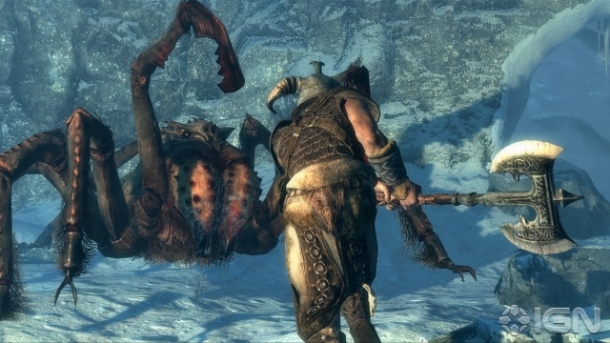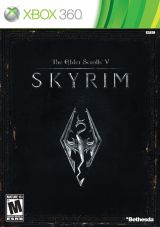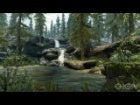Eric Neigher, Contributing Editor: So Gus, you got a chance to check out what has to be the most hotly anticipated role-playing game of the upcoming season: The Elder Scrolls: Skyrim. I think the first thing people want to know from you is "will this game be better than The Elder Scrolls IV: Oblivion?"
Gus Mastrapa, Contributing Editor: For me, the bigger question was "will this game be better than Fallout 3?" And after seeing Skyrim I offer a tentative "maybe." I thought Fallout 3's V.A.T.S. system was a great solution to Oblivion's kind-of-lame combat. And while Skyrim doesn't have a mechanism for stopping combat and directing damage, it has a completely overhauled fighting system. Melee looks way more visceral; you feel a real weight to weapons and shields as they swing, and impacts feel like they connect. Where Skyrim blows Oblivion and Fallout 3 out of the water is in the details of the world. If you thought those games were big and detailed you're going to be very pleased.

Eric Neigher: Yeah, I wasn't a big fan of the combat system in the original Oblivion, either. But, to be fair, Fallout 3 had guns -- it's easier to do V.A.T.S. with guns. That said, did they overhaul anything else in Skyrim? The quest system, the skill trees, character development? Not that those things were bad in Oblivion... but they could always be improved upon.
Gus Mastrapa: According to Bethesda's Todd Howard, Skyrim is a ground-up reworking of the Oblivion engine. Everything from the graphics engine to the way that quests are generated has been rewritten. That said, the game still feels like Elder Scrolls -- just greatly improved. When you walk into a town, people do more than stand around and talk. They have jobs; they work. And if you walk up to their anvil or workbench while they're away, you can attempt to do the same stuff. Skills are streamlined, but not dumbed down. And remember the clutter of menus you had to sift through in Oblivion? Those have been totally reimagined, making managing your characters and items way more intuitive and fun. My favorite new embellishment was the way you take perks on your skill trees. When you enter the menu, your character looks up to the heavens where you see constellations representing the different skills in the game. Each star in the constellation is a perk or bit of growth you can take as you gain strength. It's a nice touch.
Eric Neigher: I love little touches like that -- reminds me of the salad days of Ultima, where you'd create your character by answering a bunch of moral questions at a fortune-teller's wagon. So you mentioned earlier that weapons now have "weight" as they swing. Did you mean that as a statistic in the game, or that you felt a real sense of heft when you clicked the attack button? And, if so, how does that work? Hell, while your at it, tell me a bit more about some of the nifty weapons and other items you had a chance to check out.
Gus Mastrapa: The weight I speak of comes from the combat animations, the damage your weapons deal to the enemies you attack, and the sheer simplicity of mapping left- and right-hand combat to the left and right triggers. This simplified combat system works for magic as well; you can wield a sword in one hand and cast magic with another, or opt to go two-handed and use a bow. The nifty thing about all the items in the game is that they're all modeled in 3D. When you browse through your inventory, you see everything -- every gold piece, herb, and weapon. You can examine these items from every side, and great care went into making sure that something like an elven sword was crafted with flourishes that are uniquely elven. Even cooler, I think, is the fact that quest items have clues carved onto them that help you solve puzzles.

Eric Neigher: Definitely sounds nifty, but I'm getting the sense that this is more of an iterative change in the series than a sea change? Not that anything's wrong with that, but is that the impression you came away with as well?
Gus Mastrapa: That's an interesting point, and true to an extent. But maybe that's because the core coolness of the Bethesda RPG isn't broken. Sure, lots of other stuff could use attention in their games. And it feels like they're hitting all of those issues really heavily. That, of course, could be a PR line -- but I definitely saw a lot of new, interesting stuff going on in Skyrim. The first time I saw the game, the demo ended with a fairly dull dragon battle; the guy stood there and hammered on the beast until it died.
This latest demo went way differently: The hero was fighting a giant nearly twice his size when a dragon flew in, grabbed the giant with its claws, and flew away with him, eventually dropping the poor guy from a great height. This dragon battle played out much differently this time -- the hero found a nearby tower and scaled to the top of it, where he attacked the circling dragon with magic. Eventually the weakened monster crashed, plowing into the earth like an airplane with no landing gear. With the dragon aground, the hero was able to finish the creature off. Anybody who has gone toe-to-toe with a Deathclaw will tell you that a fight like that really does feel like a sea change. If Bethesda can fill Skyrim game with experiences like that, fans will be very happy.



